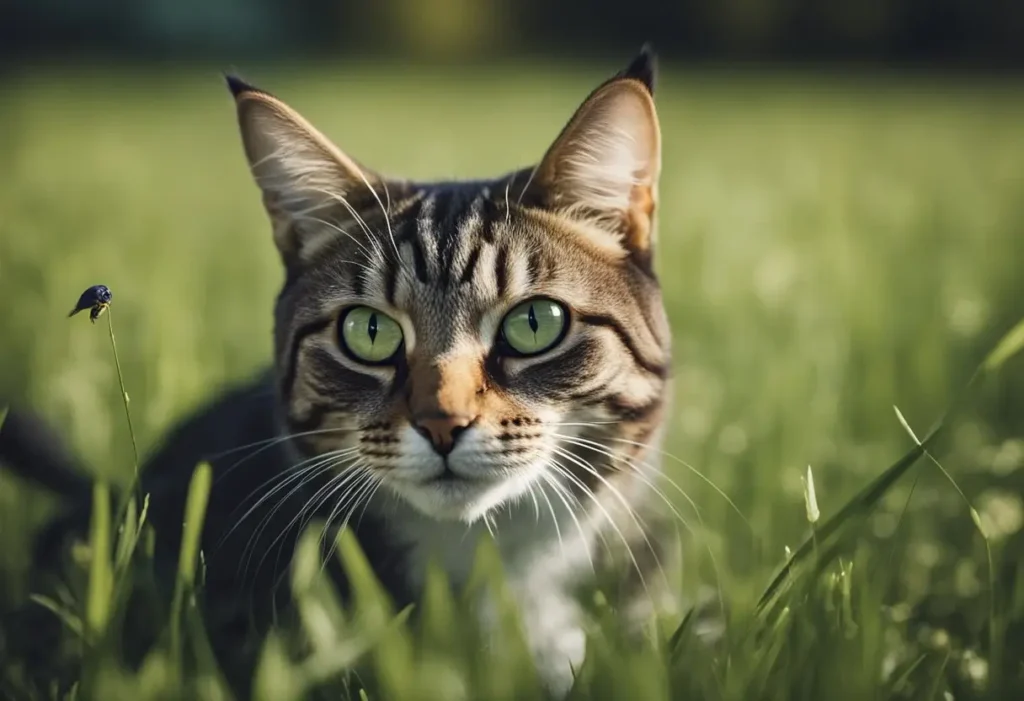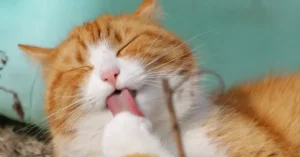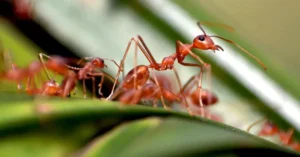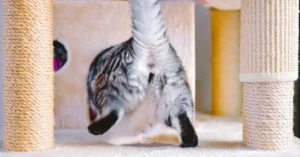We often see our feline companions carefully watching birds while crouching in the garden or perched by the window. This curious behavior might lead you to wonder, do cats eat birds? The answer is yes, cats do eat birds, as they are obligate carnivores that rely on meat for survival. Birds are indeed part of their natural prey.
However, it’s essential to note that many cats will hunt and kill birds without actually consuming them. In such cases, it seems that our furry friends just enjoy the thrill of the chase and the satisfaction of catching their prey, even if they don’t need the extra meal. So, while cats and birds might not always make the best companions, the interactions between these two species can lead to a captivating display of feline skills and instincts.
Understanding Cats’ Predatory Behavior
Have you ever wondered, do cats eat birds? Well, let’s dive into understanding their natural predatory behavior and find out.
Cats, both wild and domestic, are natural hunters with strong hunting instincts. Hunting, for cats, is not simply a matter of sustenance, but a deeply ingrained behavior that defines their existence. Domestic cats, like their wild counterparts, are obligate carnivores, which means that they rely almost exclusively on animal protein to survive. As a result, they hunt various prey, including birds. Their instinct to hunt is so intense that they may engage in this activity regardless of whether they are hungry or not.
Some of the key aspects of a cat’s predatory behavior include stalking, pouncing, and catching, which are all essential skills for an effective hunter. These natural hunters utilize their senses, such as sight, sound, and smell, to detect and track down their prey. Their agility and speed make them lethal predators, and well-equipped for catching birds. Moreover, research shows that cats are more likely to kill an animal if they are hungry, and the prey is small1.
For domestic cats, their hunting instincts might be less about survival and more about fulfilling their natural predatory behaviors. Many cat owners have been surprised to find their feline friends bringing back dead birds as gifts, which is considered a sign of respect and affection2. To curb this behavior and protect local bird populations, it’s important for us, as cat owners, to provide our pets with outlets for their hunting instincts. This can be achieved through interactive toys, providing them with a balanced diet, and ensuring they have opportunities for bird watching and other stimulating activities2.
What Do Cats Hunt?
Did you ever catch yourself wondering, “Do cats eat birds?”. We’re here to help you discover which types of prey are popular among our feline friends and how they catch them.
Birds as Prey
Cats are natural hunters, and they’re particularly fond of hunting birds. Sparrows and other small wild birds are common targets for domestic cats, primarily due to their size and availability. These birds comprise a considerable part of a cat’s natural diet, but it’s important to remember that they don’t always eat the birds they catch. Cats are known to play with their prey, without actually devouring it [1]. However, when cats do eat birds, they may leave specific parts untouched, such as the beak [2].
Rodents and Other Prey
Cats don’t limit their hunting efforts to birds; they’re also adept at catching rodents, such as mice and rats. It’s estimated that cats kill between 6.3 and 22.3 billion mammals annually in the United States alone [3]. While larger prey like ducks is less common, some skilled cats might occasionally catch them as well [4].
In addition to birds and rodents, cats may also hunt:
- Insects (e.g., grasshoppers)
- Lizards
- Scorpions
It’s important to manage your cat’s hunting behavior to ensure the safety of both wildlife and your pet. Being aware of their prey preferences and understanding their instincts is essential for responsible pet ownership.
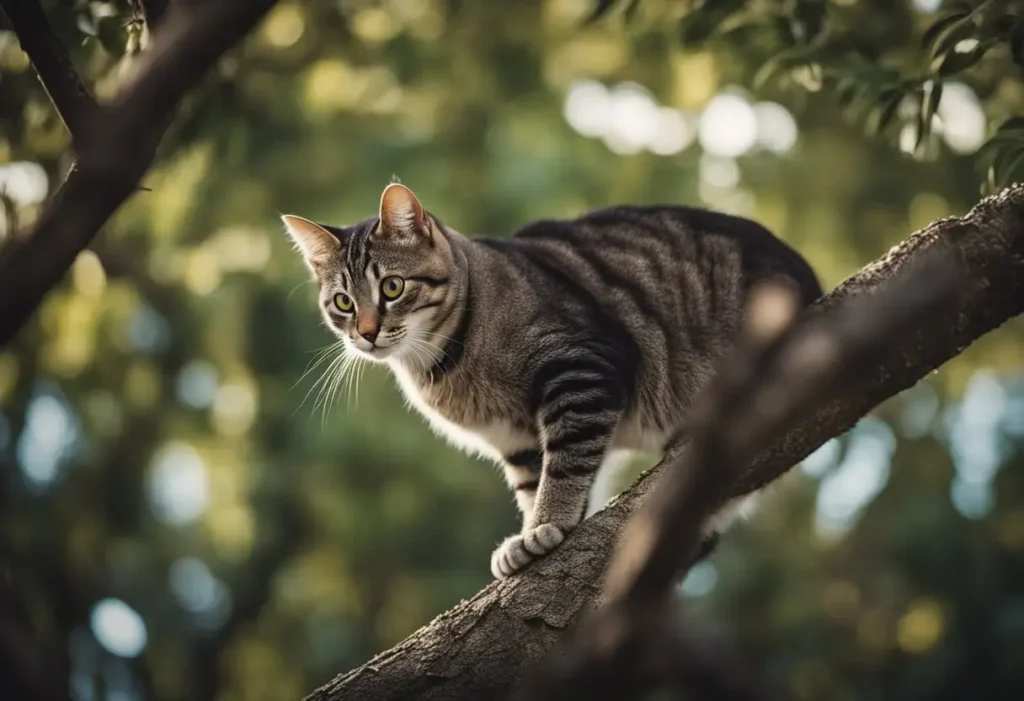
Is It Safe For Cats To Eat Birds?
So, many cat owners wonder, do cats eat birds? The answer is yes, but is it safe for cats to eat these feathered creatures? Let’s explore this in more detail.
Cats are natural predators and may enjoy hunting and eating birds. However, there can be potential health risks associated with this behavior. Birds can carry diseases and parasites that may be transmitted to your cat, causing illnesses. Some of the risks include:
- Bacterial infections: caused by Salmonella and Campylobacter
- Parasitic infections: such as avian mites or fleas
- Viral infections: like avian influenza
It is also worth noting that wild birds may be exposed to pesticides or toxins, which could harm your cat if ingested.
On the other hand, some believe that birds can provide certain health benefits to cats. Eating birds occasionally might help cats meet their nutritional needs when they’re not getting enough from their daily diet1. Still, it’s essential to make sure your cat has a balanced and well-suited diet to avoid any deficiencies.
If you’re worried about your cat eating birds, it’s always a good idea to consult with your veterinarian. They can guide how to avoid health risks, as well as evaluate your cat’s diet and recommend changes if needed.
As a responsible cat owner, it’s crucial to keep in mind that allowing your cat to hunt birds can significantly impact the local bird population. In some areas, predation by cats has led to a decline in native bird species2. To protect local birds and minimize possible health risks to your cat, consider providing stimulating toys and activities that mimic their natural hunting instincts indoors.
So while it might be safe for cats to eat birds on rare occasions, there are risks involved. Providing a diverse indoor environment and consulting with your veterinarian will help ensure that your feline friend stays healthy, happy, and safe.
Health Risks for Cats Eating Birds
As cat owners, we might have wondered, do cats eat birds? And if they do, are there any health risks involved? In this section, we’ll explore the possible health risks associated with cats consuming birds, focusing on physical injury and disease risks, as well as parasites and bacterial infections.
Physical Injury and Disease Risks
Although birds might seem like natural prey for cats, consuming them can pose some potential health hazards. For starters, certain parts of the bird, like feathers and bones, can be difficult for cats to digest. Cats may experience gagging or choking if they attempt to swallow feathers without properly chewing them. Moreover, sharp bones can cause injury to the cat’s throat or digestive system.
Besides physical injury risks, cats eating birds can also be exposed to various diseases. Infected birds can transmit illnesses like songbird fever to cats, which can lead to high temperature and lethargy. Additionally, birds can carry other diseases like salmonella, a type of food poisoning that can cause severe diarrhea and dehydration in cats.
Parasites and Bacterial Infections
When cats eat birds, they can also become infected with a range of parasites, such as fleas, ticks, roundworms, and tapeworms. These external parasites can cause itching and skin irritation, while internal parasites can lead to weight loss, anorexia, and other digestive issues.
Moreover, cats can become infected with bacteria from consuming birds. One such bacterial infection is salmonella, which can cause fever, diarrhea, and vomiting. Similarly, there’s a potential risk of E. coli infection, which might induce abdominal pain and diarrhea.
To help cat owners understand the risks, we’ve compiled a table summarizing the common health risks for cats eating birds:
| Health Risk | Symptoms or Issues |
|---|---|
| Physical Injury | Choking or injury from feathers and bones |
| Disease | Songbird fever, salmonella, and other infections |
| Parasites | Fleas, ticks, roundworms, tapeworms |
| Bacterial Infections | Food poisoning, E. coli, diarrhea, vomiting, abdominal pain |
So you need to know while cats might naturally hunt birds, it’s essential for us, as responsible pet owners, to be aware of the potential health risks associated with cats eating birds. With this knowledge, we can take necessary precautions to protect our feline friends from harm.
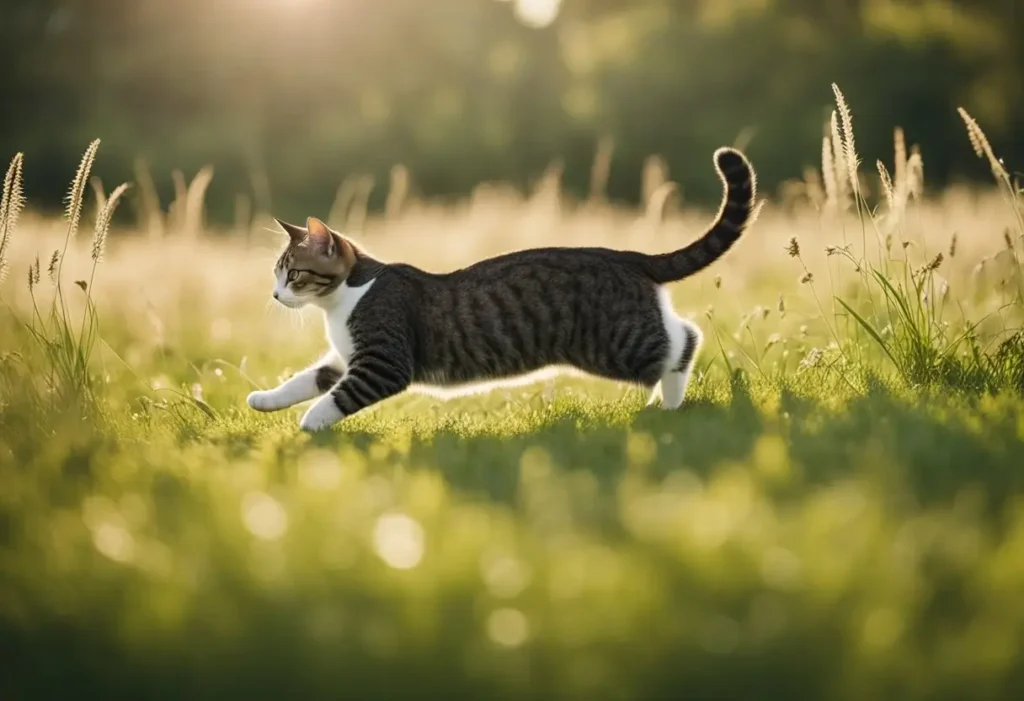
Impact on Bird Populations
As many pet owners may wonder, do cats eat birds? The answer is yes, and unfortunately, the impact of outdoor cats on bird populations has become an alarming issue in recent years. We will present the effects that cats have on these populations, as well as some of the challenges that this predation behavior presents.
Outdoor cats, especially feral or unowned ones, pose a significant threat to our feathered friends. Approximately 2.4 billion birds are killed by outdoor cats in the United States alone every year. The hunting habits of these cats have made them extremely detrimental to bird populations. Free-ranging cats are considered the single greatest source of anthropogenic mortality for US birds and mammals.
The damage inflicted on bird populations becomes even more apparent in specific conditions. For example, on certain islands or areas where bird species have evolved without land predators, cats have caused the local extinction of some bird species. These vulnerable birds are simply not equipped to cope with skilled feline hunters encroaching on their habitat.
Aside from the ecological concerns, several complications arise from such a massive decline in bird populations. The predation of cats puts pressure on the conservation of various bird species, leading to an imbalance in ecosystems. Additionally, the extensive presence of outdoor cats has been linked to an increased risk of toxoplasmosis or rabies exposure in human populations. All of these factors contribute to an urgent need for effective solutions and mitigation efforts.
Cats’ Dietary Needs
When discussing a topic like “Do cats eat birds,” it’s vital to consider the dietary needs of our feline companions. As obligate carnivores, cats require a diet primarily composed of meat to fulfill their nutritional needs. Let’s take a closer look at the various aspects of a cat’s diet and how it relates to hunting and consuming birds.
Cats have evolved to meet their nutritional requirements by consuming prey animals, like birds and small mammals. Their diet is typically high in protein, fat, and a select group of crucial nutrients. One essential nutrient found in birds is taurine, which supports cats’ heart health and vision source.
In the wild, cats’ natural diet consists of approximately:
However, not all aspects of a bird-based diet are beneficial for our pets. Ingesting certain bird parts, such as their bones or feathers, can potentially cause harm to a cat’s digestive system, leading to issues like vomiting or diarrhea. Possible exposure to diseases or toxins, like lead or other harmful substances, could also pose a risk to a cat’s overall health source.
It’s important to remember that, in many cases, cats don’t necessarily hunt out of hunger. They may pursue birds and other prey for mental stimulation or instinct-driven predation. This means that while cats do eat birds, not all of them will consume their prey, even if they successfully catch its source.
To ensure our feline friends receive proper nutrition without facing unnecessary risks, it’s wise to provide them with a balanced, commercially prepared diet tailored to their life stage and weight. This way, we can keep our cats healthy and happy while safeguarding the bird populations from excessive predation.
Alternatives to Birds for Cats’ Hunting Instinct
As cat owners, we understand that our feline friends have a strong hunting instinct and may wonder, “Do cats eat birds?” Though cats do eat birds, it’s our responsibility to provide safer alternatives to satisfy their predatory nature. We’ve compiled a few ideas to help keep your cat entertained and properly stimulated without the risks associated with consuming wild birds.
1. Interactive Toys: Utilize various interactive toys such as feather wands, laser pointers, and motorized mice to engage your cat’s hunting behavior. Make sure to let them catch the toy occasionally, allowing them to feel rewarded for their efforts.
2. Puzzle Feeders: Encourage your cat’s predation skills by using puzzle feeders that challenge them to work for their food. Simulating the hunt, this type of feeder makes mealtime more interactive and keeps cats mentally stimulated.
3. Bird Watching: Set up safe, distant bird-watching spots for your cat by placing a bird feeder outside a window with a comfortable perch nearby. Your cat can watch and admire the birds without posing a threat to them.
4. Playtime: Dedicate time each day to actively play with your cat. Use a variety of toys that encourage them to jump, paw, and chase, such as feather wands and crinkle balls. This helps satisfy your cat’s instinct, prevents restlessness, and promotes bonding between the two of you.
5. Leash Training: With guidance from your veterinarian, consider leash training your cat. This enables them to explore the outdoors while under your control, avoiding potential risks from bird hunting.
Incorporating these activities into your cat’s routine not only keeps them satisfied and occupied, it also minimizes the harms associated with their natural hunting instincts. By offering healthier alternatives, we can provide our feline companions with the necessary stimulation to support their well-being without compromising the safety of our local bird populations.
Protecting Birds From Cats
Yes, it’s true; cats do eat birds. As much as we love our feline friends, we also want to protect our feathered ones. Outdoor cats, indoor cats, and feral cats all pose dangers to birds, but there are ways to help. In this section, we’ll discuss methods to protect birds without restraining the instincts of cats.
First, let’s talk about keeping birds safe from outdoor cats. One effective strategy is the proper placement of bird feeders and birdbaths. Ideally, they should be located at least 10 to 12 feet away from potential hiding spots for cats. This will make it more challenging for cats to ambush unsuspecting birds. If outdoor cats are staking out your bird feeders as hunting grounds, you may need to remove the feeders temporarily to protect the birds.
For indoor cats, consider creating a designated outdoor catio. A catio is an enclosed outdoor space that allows your cat to enjoy the fresh air without posing a threat to birds. This gives your cat the enjoyment of being outdoors without the dangers they may cause to birds.
On the other hand, feral cats can be more challenging to manage. If necessary, work with local animal control or a trap-neuter-return (TNR) program to help reduce the feral cat population in your area.
Moreover, we can also make our gardens less appealing to cats. Planting thorny bushes and using sharp mulches around bird-friendly areas can deter cats from entering those spaces. Inspecting fencing regularly and repairing any gaps or holes will also help keep cats away.
Lastly, prevention is key. Encourage responsible pet ownership by advising fellow cat owners to keep their cats indoors or utilize secure outdoor enclosures. Spreading awareness about the potential dangers cats pose to birds is essential in making our shared environment safer for all.
So, by implementing these measures, we can strike a balance between our love for cats and our desire to protect birds, creating harmony between the two species.
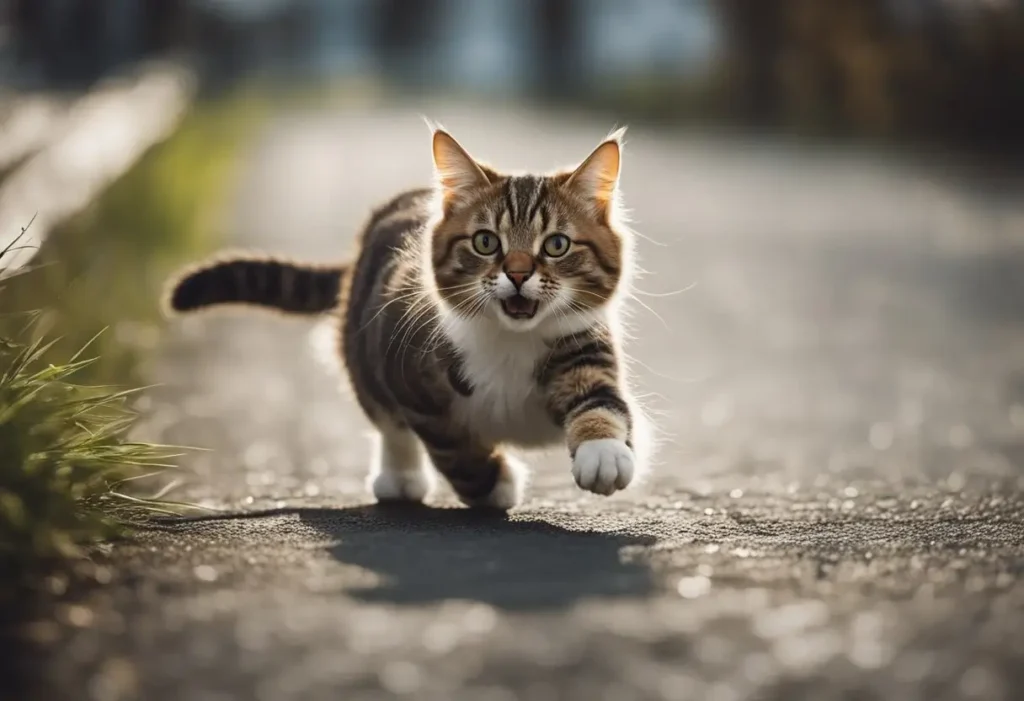
Our thoughts about do cats eat birds
As cat lovers, we often wonder about our feline friend’s natural hunting instincts. One question that comes to mind is: do cats eat birds? It’s an interesting topic to ponder, so let’s dive in and explore the answer.
Cats are natural hunters, and their instincts drive them to pursue not only small mammals like mice and rats but also birds. It’s no surprise that many cats are attracted to feathery toys, which indicate their interest in bird hunting. However, not all cats will eat birds after catching them. Some might just play with their prey, while others may kill but not eat them. This can depend on factors such as hunger and individual preferences.
There are concerns regarding the safety of cats consuming birds, especially wild ones. Some people argue that wild birds might transmit diseases to cats, potentially posing health risks. On the other hand, others believe that consuming birds can provide certain health benefits to cats, such as a natural source of protein. It’s essential to consider these factors and decide what’s best for your feline friend.
When it comes to cats’ dietary habits, you might notice that some cats, if they do eat birds, might only consume specific parts of the prey. As observed by Untamed, cats don’t always devour the entire bird like a hungry animal would. This could be due to cats’ particular preferences in their diet.
Regardless of whether your cat eats birds or not, it’s crucial to understand their nutritional needs and provide them with a balanced diet. A healthy diet will ensure that your cat maintains good health and stays active, minimizing the need to hunt and consume birds.
FAQ: Do Cats Eat Birds?
Do cats eat the entire bird?
Yes, cats can eat birds, but they often don’t consume the whole bird. Sometimes, they might avoid eating the beak, gizzard, wing belly, tail, upper feathers, and large bones. So while it’s true that cats eat birds, how much of the bird they consume can vary.
Can you train a cat not to eat a bird?
Though it might be difficult, you can attempt to train your cat not to eat birds. Here are a few methods we recommend:
Keep your cat indoors: By limiting their outdoor time, you reduce their opportunities to hunt and eat birds.
Use a bell collar: A bell attached to your cat’s collar can help warn birds of their presence, giving them a chance to escape.
However, be prepared for the possibility that your cat’s instincts might still lead them to hunt birds even with training.
Do cats eat bird feathers?
While feathers might be a cat’s favorite plaything, they generally don’t eat them. Cats may occasionally ingest feathers while grooming themselves after catching a bird. But, since their digestive systems are not designed to process feathers, it’s not a regular part of their diet.
If you also would like to know something about how to keep cats from eating plants have a look at our article.
If you are interested in special breeds like the biggest House cat breed it would be a pleasure if you read our article.
What are your thoughts about the question “Do cats eat birds?” Let us know in the comments.

